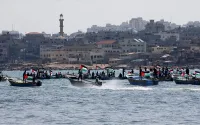14 June 2005
The exercises come in the shadow of an attack in Mauritania that has raised the spectre of cross-border violence in the isolated and volatile region.
Representing all four branches of the US military, 1000 troops have arrived for two weeks of exercises under way in Mali, Algeria, Chad, Niger and Mauritania."This is a historical exercise because never before have so many African countries participated in such a joint operation," Major Holly Silkman of the US European Command said of Operation Flintlock."It's a counterterrorism measure focussing on the border areas in the trans-Sahara region, to show that wherever there are terrorists, we will help root them out," she said.Islamist crackdown
Although the multi-million-dollar operations have been planned for some time, they come at an opportune time for the region.
Insurgents claiming affiliation with the Algerian Salafist Group for Preaching and Combat swooped onto a remote military base in northeastern Mauritania on 4 June, killing 15, wounding 17 and carrying off two hostages as well as an assortment of vehicles and military equipment.
Amid scepticism of senior Algerian military officials that the GSPC could mount such a major operation, its ranks thinned by 10 years of pursuit, the group said that it waged the attack in revenge for Nouakchott's weeks-long crackdown on the country's Islamist movement.At the weekend, Senegal will host a two-day counter-terrorism training scenario, to also involve Morocco, Tunisia and Nigeria, which underscores the importance of Africa's largest country, Silkman added."There is a lot of wealth and potential for trouble because Nigeria's oil is a major focus of many countries," she said.Radicalism
Building on a two year effort in Mauritania, Mali, Niger and Chad, the US Congress recently approved a budget of $100 million over five years, from 2007, for the new Trans-Sahara Counterterrorist Initiative, expanding to cover the other countries in the current exercise.But such a militarisation of US involvement in west Africa, among the world's poorest countries, risks alienating populations and establishing breeding grounds for the kind of radicalism the US is trying to avoid, critics such as the International Crisis Group contend.But, according to Silkman, "infrastructure development is tough if there is no stability, and you cannot have stability without security".The exercises also aim to foster tighter relations between the well-funded and outfitted US military and the armed forces in its poorer partners, many of which can only just clothe and arm their troops.
http://english.aljazeera.net/NR/exeres/668B5817-A6F9-4534-9B7E-0C3B45EE5581.htm






